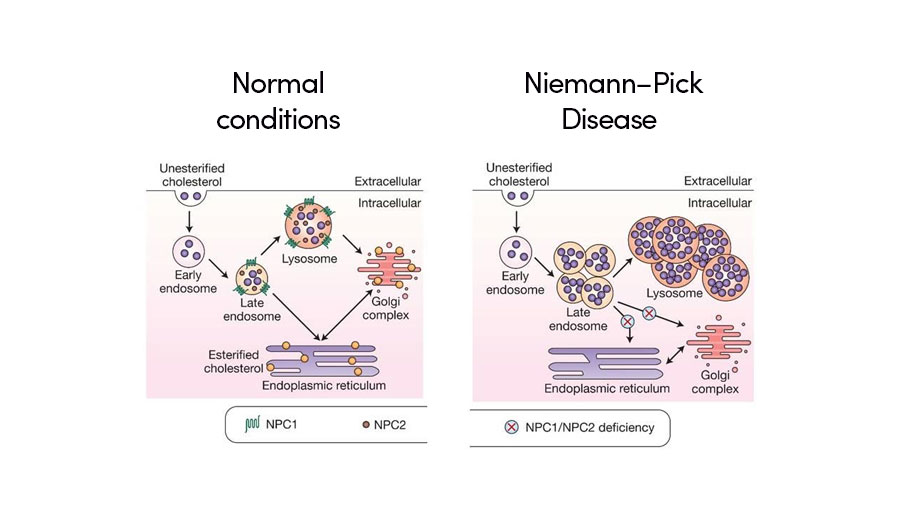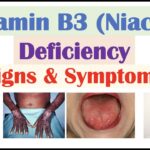Niemann Pick disease type C (NPC) is a rare, inherited lysosomal storage disorder that affects lipid metabolism, leading to progressive neurological decline. It results from mutations in the NPC1 or NPC2 gene, which disrupt cholesterol and lipid transport within cells, causing toxic accumulation in the brain, liver, and spleen. NPC primarily affects children but can manifest at any age. Early diagnosis and intervention are crucial in managing symptoms and improving quality of life.

Genetic and Molecular Basis of NPC
Role of the NPC1 and NPC2 Genes
- NPC1 gene (95% of cases): Encodes a transmembrane protein responsible for intracellular cholesterol transport.
- NPC2 gene (5% of cases): Produces a soluble protein that assists in cholesterol movement within lysosomes.
Mutations in either gene result in cholesterol entrapment within lysosomes, impairing cellular function and triggering neurodegeneration.
Causes and Risk Factors
Genetic Inheritance
- NPC follows an autosomal recessive inheritance pattern, meaning both parents must be carriers of a defective NPC1 or NPC2 gene for a child to inherit the disease.
Prevalence
- NPC affects approximately 1 in 100,000 to 120,000 live births worldwide.
- Higher prevalence in genetically isolated populations due to founder mutations.
Clinical Symptoms of Niemann-Pick Disease Type C
Early Signs and Symptoms
- Delayed developmental milestones in infants and toddlers.
- Jaundice (neonatal cholestasis) in newborns.
- Hepatosplenomegaly (enlarged liver and spleen) in childhood.
Neurological Manifestations
- Cognitive decline and learning difficulties.
- Vertical supranuclear gaze palsy (VSGP) – an early sign where patients struggle to move their eyes up and down.
- Dystonia and ataxia – involuntary muscle contractions and coordination issues.
- Seizures and cataplexy (sudden loss of muscle tone triggered by emotions).
Psychiatric and Behavioral Symptoms
- Depression, anxiety, and psychosis in adolescent and adult-onset NPC.
- Sleep disturbances and hallucinations in later stages.
Disease Progression
NPC worsens over time, leading to severe motor dysfunction, dementia, and premature death, often in adolescence or early adulthood.
Diagnosis of Niemann-Pick Disease Type C
1. Clinical Assessment
- Patient history and symptom evaluation, focusing on hepatic, neurological, and psychiatric signs.
- Family genetic history to identify potential hereditary risks.
2. Biomarker Testing
- Filipin Staining Test: A diagnostic tool that detects cholesterol accumulation in cultured skin fibroblasts.
- Oxysterol and bile acid markers: Elevated in NPC patients and used for screening.
3. Genetic Testing
- DNA sequencing of NPC1 and NPC2 genes confirms mutations and provides definitive diagnosis.
4. Imaging and Neurological Tests
- Brain MRI: Identifies brain atrophy and white matter abnormalities.
- EEG and nerve conduction studies: Assess neurological deterioration.
Current and Emerging Treatments for NPC
1. Symptomatic Management
- Seizure control: Anti-epileptic drugs such as valproate and levetiracetam.
- Muscle spasticity relief: Baclofen or botulinum toxin injections.
- Psychiatric support: Antidepressants and antipsychotics for behavioral symptoms.
2. Disease-Modifying Therapy
- Miglustat (Zavesca): A small-molecule therapy that inhibits glycosphingolipid accumulation, slowing neurodegeneration.
3. Investigational Treatments
- Gene Therapy: Research is exploring NPC1 gene editing using CRISPR technology.
- Substrate Reduction Therapy: Novel compounds aim to decrease toxic lipid buildup.
4. Supportive Care and Rehabilitation
- Physical and occupational therapy to maintain mobility and coordination.
- Speech therapy for progressive dysphagia (swallowing difficulties).
Prognosis and Life Expectancy
The rate of disease progression varies, with earlier onset forms generally leading to a shorter lifespan (teens to early adulthood). However, late-onset NPC patients may live into their 40s or 50s with supportive care. Advances in early diagnosis and novel therapies continue to improve outcomes.
Ongoing Research and Future Perspectives
1. Stem Cell Therapy
- Investigational trials are exploring stem cell transplantation to restore normal lipid metabolism.
2. Pharmacological Chaperones
- Small molecules designed to stabilize mutated NPC1 proteins are in early-stage trials.
3. Enzyme Replacement Therapy (ERT)
- Research is assessing exogenous NPC1/2 enzyme infusion as a potential treatment approach.
Niemann-Pick disease type C is a devastating genetic disorder that affects multiple organ systems, particularly the nervous system. While no cure currently exists, early diagnosis, symptom management, and emerging therapies offer hope for improved quality of life. Ongoing research continues to explore gene therapy, novel drug treatments, and disease-modifying interventions to combat NPC.

